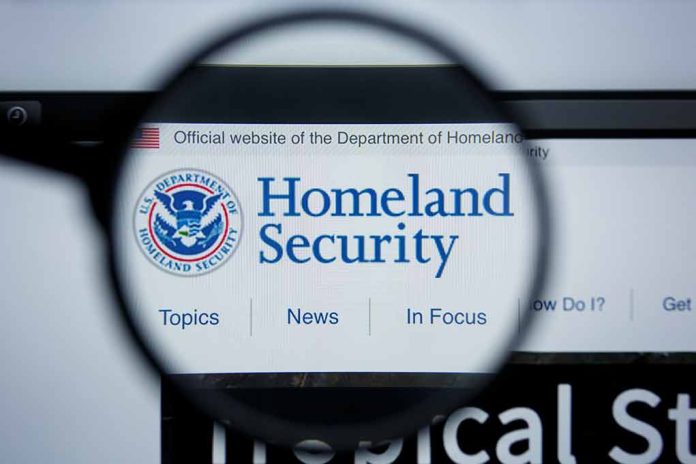
In a decisive end to the controversial “Catch and Release” policy, Department of Homeland Security Secretary Kristi Noem has authorized ICE agents to arrest illegal immigrants directly at their court hearings, signaling the Trump administration’s hardline commitment to border enforcement and deportation of those who entered the country illegally.
Key Takeaways
- DHS Secretary Kristi Noem has formally ended the “Catch and Release” policy, authorizing ICE to arrest illegal immigrants at court hearings
- Expedited removal procedures are now targeting individuals who entered the U.S. illegally within the last two years, allowing for deportation without immigration court hearings
- The Trump administration is using expanded detention capacity and stricter enforcement of immigration laws to deter illegal border crossings
- The new policy has sparked protests in sanctuary cities like Phoenix, where activists claim families are being separated during enforcement operations
- The Laken Riley Act has strengthened immigration enforcement by mandating detention for undocumented immigrants accused of specific offenses
Trump Administration Dismantles Biden-Era Immigration Policies
The Department of Homeland Security under Secretary Kristi Noem is systematically reversing immigration policies implemented during the Biden administration. The most significant change is the termination of “Catch and Release,” a practice that allowed illegal immigrants to remain free in the United States while awaiting immigration court proceedings. This policy shift represents a return to the stricter immigration enforcement promised by President Trump during his campaign. ICE agents are now empowered to arrest illegal immigrants when they appear for court hearings, particularly targeting individuals who entered the country illegally within the past two years.
“Secretary Noem is reversing Biden’s catch and release policy that allowed millions of unvetted illegal aliens to be let loose on American streets. This Administration is once again implementing the rule of law,” according to the DHS statement to FOX.
The reinstated enforcement mechanisms leverage expedited removal procedures, which allow for quick deportations without requiring a hearing before an immigration judge. This applies when illegal immigrants do not have active or pending immigration cases. The policy maintains provisions for those with valid credible fear claims to continue through immigration proceedings, but others now face swift deportation. This approach aligns with President Trump’s campaign promises to secure the border and enforce immigration laws more rigorously than his predecessor.
Sanctuary Cities Face Increased Immigration Enforcement
Sanctuary cities like Phoenix are experiencing heightened immigration enforcement activities under the new directives. These operations have triggered protests from immigration activists who oppose the more stringent approach. Reports indicate that immigration enforcement officials are apprehending individuals at courthouses and during scheduled hearings, leading to immediate detention. This represents a significant departure from previous practices where court appearances rarely resulted in immediate arrest. The enforcement strategy has created tension in communities with large immigrant populations, where activists claim families are being separated.
“We have seen over 20 families separated and rushed and funneled into vans, arrested in courtrooms, and shamed,” said Monica Sandshaper.
Progressive advocacy groups have expressed alarm over the new enforcement operations, characterizing the detentions and deportations as unnecessarily harsh. However, supporters of the policy argue that enforcing immigration laws is essential for national security and maintaining the integrity of the legal immigration system. The operations in Phoenix highlight the broader national debate about immigration enforcement priorities and the proper balance between humanitarian concerns and the rule of law. For communities that have previously operated as sanctuaries, the shift represents a significant change in the relationship with federal immigration authorities.
Legal Framework and Challenges to Ending “Catch and Release”
The “Catch and Release” policy has been described as a “collection of policies, court precedents, executive actions and federal statutes spanning more than 20 years, cobbled together throughout Democratic and Republican administrations.” The policy is rooted in the Immigration and Nationality Act, which allows for parole of immigrants for humanitarian reasons or public benefit. Additionally, the Flores Settlement Agreement has mandated that minors in immigration custody be held in the “least restrictive setting” and released without unnecessary delay, typically within 20 days.
The Trump administration’s approach to ending “Catch and Release” includes increasing detention capacity, limiting parole, and expanding the use of expedited removal. The recently enacted Laken Riley Act further strengthens these efforts by mandating detention for undocumented immigrants accused of specific offenses and allowing states to sue the federal government for non-enforcement of immigration laws. However, these changes may face legal challenges, particularly where they conflict with existing court settlements like the Flores Agreement, which courts have historically upheld.
Impact on Border Security and Illegal Immigration
The termination of “Catch and Release” represents a cornerstone of President Trump’s border security strategy. By ensuring that illegal entrants face detention rather than release into the country, the administration aims to create a powerful deterrent against unauthorized border crossings. This approach contrasts sharply with the previous administration’s policies, which critics argued incentivized illegal immigration by allowing apprehended migrants to remain in the United States while awaiting hearings that might be scheduled years in the future. Under the new policy, expedited removal processes are expected to significantly reduce the backlog in immigration courts.
The policy changes have garnered strong support from advocates of stricter immigration enforcement who believe the previous system encouraged illegal entry and asylum fraud. Border Patrol officials have reported that the knowledge that illegal immigrants will be detained rather than released has already begun to influence migration patterns. For American communities that have struggled with the impacts of uncontrolled immigration, including strained public services and increased competition for jobs, the policy shift represents a welcome change that prioritizes the interests of legal residents and citizens over those who have entered the country unlawfully.





